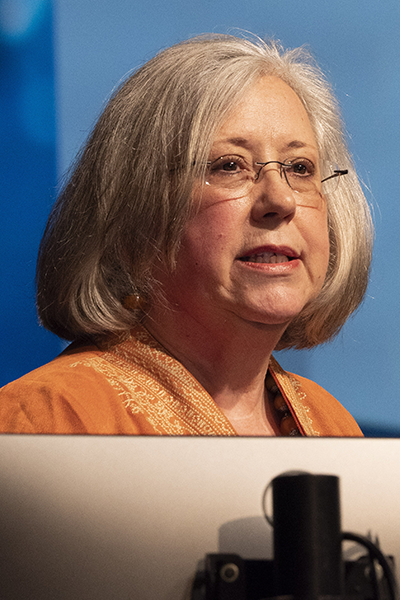AACR President connects the past and future of cancer research during address
//
Estimated Read Time:
If there’s one lesson to take away from the past five years of cancer research, it’s that a diversity of thought is an asset, said AACR President Lisa M. Coussens, PhD, FAACR.

Diversity of thought is what helped her unearth unique research on how to use leukocyte communication to interrupt the tumor microenvironment. As the Deputy Director for Basic & Translational Research of the Knight Cancer Institute at Oregon Health & Science University, she tied together concepts from immunology, data science, and biology in her own lab to make these discoveries.
Coussens discussed her past and current research as well as her hopes for the future of cancer research during her presidential address on Sunday, April 16. The 45-minute presentation, Identifying Immune Vulnerabilities in Solid Tumors – Leukocyte Communication Networks Regulate Neoplastic Progression and Response to Therapy, traversed the entirety of her career, as she explained how her own research is emblematic of the direction the field should take as a whole.
“What I would like to do is just to tell you a story about how the research in my lab has evolved over my career… We initially thought about tumors pretty simplistically. Now that has really exploded into how we think about targeting tumors and their vulnerabilities today,” she said.
When Coussens began her career, the models for studying cancer were relatively straightforward. Cell cultures and individual biopsies from cancer patients were the bread and butter.
“We thought of cancer as cells in a dish, or what we could get out of the operating room,” she said. “It was unusual to be able to dissect a premalignant lesion and to think about cancer as a progressive pathway.”
But advances in technology, like the introduction of transgenic mice models, improved capabilities in the lab. Coussens used these models to hone in on a unique facet of tumor biology. After collaborating with scientists from different specialties, Coussens and her research team hypothesized a series of treatments involving immune modulators, epigenetic editing, and traditional cytotoxic drugs. By utilizing multidisciplinary concepts and the opinions of many different collaborators, they were able to interrupt the tumor microenvironment in a lab setting.
Coussens said that these stories from her lab “tell us that all the communication networks between all the different leukocytes that are in the tumor microenvironment can’t be ignored. We have to think about how T cells regulate and how the myeloid microenvironment talks to dendritic cells.”
The overview of her research also served as a reminder of the changing nature of cancer research. Coussens explained how the next five years of cancer research will depend on more collaboration between specialties and will require more nuanced thinking about how to approach each tumor within each part of the body.
“The actual puzzle of putting together all of these different heterogenous aspects that control tumor growth are important vulnerabilities to understand,” she said. “It’s going to take biologists and immunologists collaborating with data scientists to help us understand how these puzzle pieces are integrated and how best to attack the issue of cancer control.”
Coussens’ presentation can be viewed on the virtual meeting platform through July 19, 2023.




